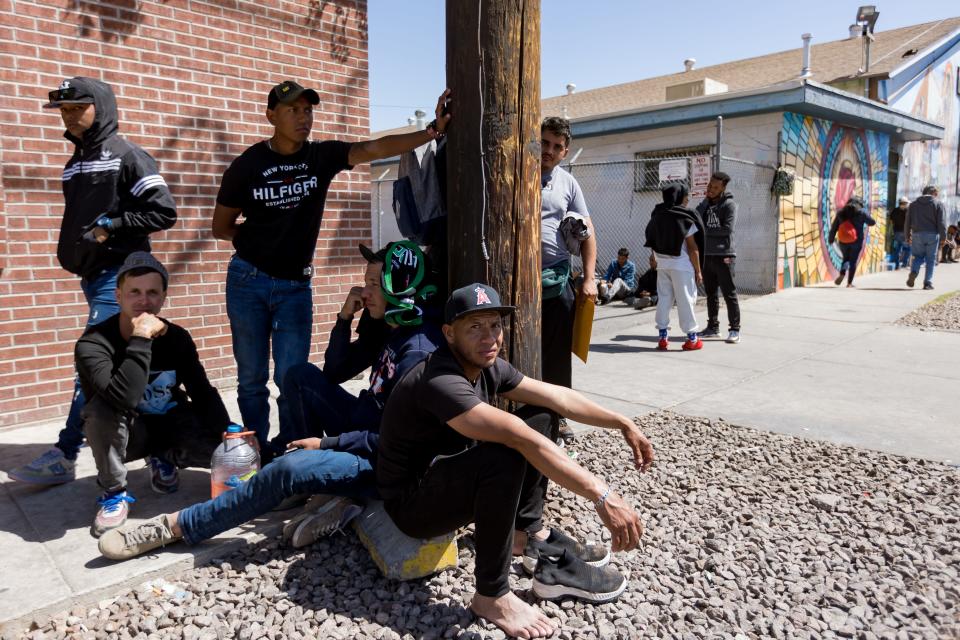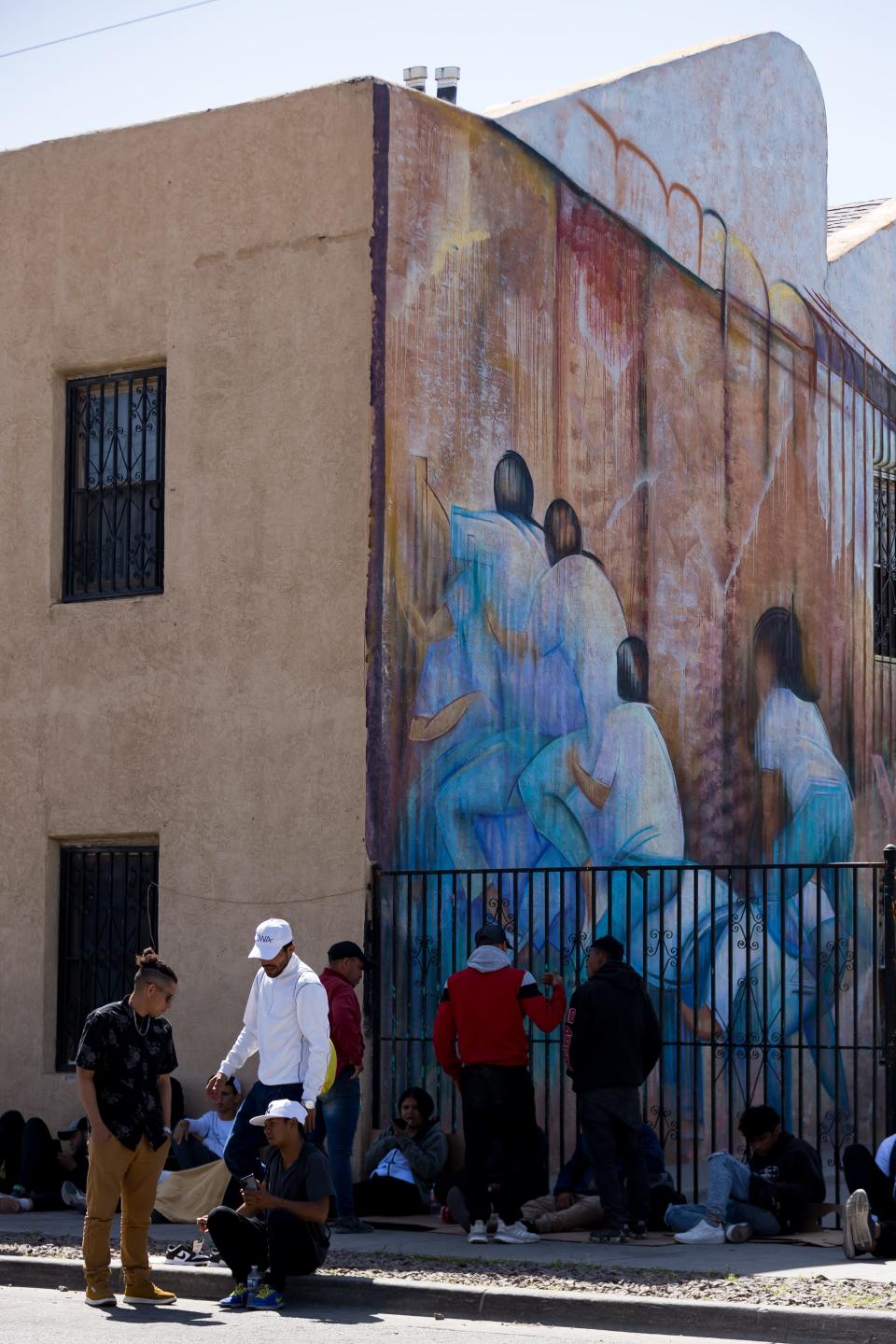El Paso declares border migrant 'state of emergency' as Title 42 nears end
- Oops!Something went wrong.Please try again later.
El Paso will declare a "state of emergency" starting Monday in anticipation of a potential influx of thousands of migrants with the end of Title 42 pandemic law next week, Mayor Oscar Leeser said at a Sunday news conference.
There are already hundreds of migrants sleeping on sidewalks around Sacred Heart Catholic Church in Downtown and overflowing at the Opportunity Center for the Homeless in the Magoffin area of the South Side.
"We are getting prepared now for what we call the unknown," Leeser said, explaining that the emergency declaration allows the city to open up temporary shelters.

There had been unconfirmed estimates of up to 35,000 asylum seekers waiting in Juárez, Mexico, to cross the U.S. border once Title 42 expires on May 11.
The latest estimates are that there are 10,000 to 12,000 migrants in Juárez, where shelters aren't full but tent camps line streets in front of Juárez city hall near the Paso Del Norte Bridge, said Leeser, who spent four hours in the Mexican city on Friday reviewing the situation.
El Paso declares 'state of emergency' over migrant surge
The El Paso "state of emergency" begins at 12:01 a.m. Monday and lasts seven days before it goes to the City Council to be ratified for 30 days, the mayor said. The declaration helps the city to open up emergency shelters and use federal funds.
The city is prepping to open two temporary shelters at the vacant Bassett Middle School in Central El Paso and Morehead Middle School on the West Side. If needed, it may also use the Judson F. Williams Convention Center in Downtown, officials said.
Immigration: 'We are on edge': Migrant fears grow in El Paso border neighborhoods as Title 42 end nears
“We need to put everything in place to meets those demands," El Paso Deputy City Manager Mario D'Agostino said.
The city is working with the American Red Cross, churches and charities to provide shelter and will be enforcing no-camping laws and will continue cleanups of blankets, waste and trash as safety and health measures at migrant camp sites.
The mayor emphasized that El Paso police will not enforce immigration law, which is a federal purview.
Nation: Biden plan aims to stem border migration as restrictions end
There are concerns that migrant sidewalk camps could fester crime, health and safety hazards if left to grow. There were five calls tied to camps regarding the exploitation of young women and drugs over the weekend, the mayor mentioned.
The city is asking the public to not to drop off donations at the encampments. “It encourages those large congregations on the streets," D'Agostino said.
Community members can help by making monetary donations and volunteering at local charities, shelters and non-governmental organizations assisting refugees in El Paso. A list is available at online at elpasotexas.gov/migrant-crisis/donate/
El Paso mayor: The border is not open
Title 42, which quickly returned migrants to Mexico during the COVID-19 pandemic, expires at the end of the day on May 11, Leeser said.
It is "bothersome" that migrants are waiting for Title 42 to expire, falsely believing they will be allowed to enter the U.S. without any documentation, Leeser said. A similar migrant surge occurred last fall.
“We are not opening the borders. The borders are not open today and they will not be open on May 12," Leeser said.
More: How will El Paso handle the end of Title 42? Border Patrol chief shares his plans
Even when Title 42 ends, the U.S. Border Patrol is still enforcing Title 8 immigration law, which consequences include deportation and a five-year re-entry ban.

The federal immigration system is "broken" and El Paso, other border cities and the United States cannot continue without changes being made, Leeser said. "There is no end game to this," he said.
A week ago, the Border Patrol was seeing 1,300 migrants a day in its El Paso Sector, which covers the westernmost tip of Texas and all of New Mexico, agents said.
Unprocessed, unsponsored migrants present challenges
The challenges facing the city of El Paso are due to "unprocessed" and "unsponsored" migrants, officials said.
"Unprocessed" migrants are basically migrants who illegally entered the U.S., circumvented the process at the border and don't have permission to travel onward.
The "unprocessed" migrants are a "great concern" because the city can't house them in shelters receiving federal funding due to their immigration status, D'Agostino said last week.
"Unsponsored" migrants are generally asylum seekers who are processed and then released from U.S. Customs and Border Protection custody but don't have money and sponsors who will pay for them to continue their journey to their destination.
Immigration: Last bus out: How one family's trip on a migrant bus delivered a dream
Last fall, about half of the Venezuelan migrants who arrived in El Paso had no financial means to get to where they were going, which caused the city to charter long-distance buses to other cities, D'Agostino said.
El Paso is working on plans where migrants would be transported by overnight charter bus directly to Houston airports where they would catch flights to their destination, officials said. No other possible airport hubs have been mentioned.
The city of El Paso helps with travel plans and migrants are not transported without their permission, officials noted.
Migration surges in other parts of Texas border
Similar migrant surges are occurring in other parts of the Texas border.
In Brownsville, shelters are struggling to find space for migrants who authorities said have abruptly begun crossing by the thousands from Mexico, the Associated Press reported.
Since last week, officials said that more than 15,000 people, mostly from Venezuela, had illegally crossed in the Brownsville area, a sharp rise from the 1,700 migrants that the Border Patrol encountered in the first two weeks of April, the Associated Press reported.
Immigration system: US to open migration centers in Guatemala, Colombia in attempt to stop post-Title 42 surge
This article originally appeared on El Paso Times: As Title 42 ends, El Paso declares border 'state of emergency'

